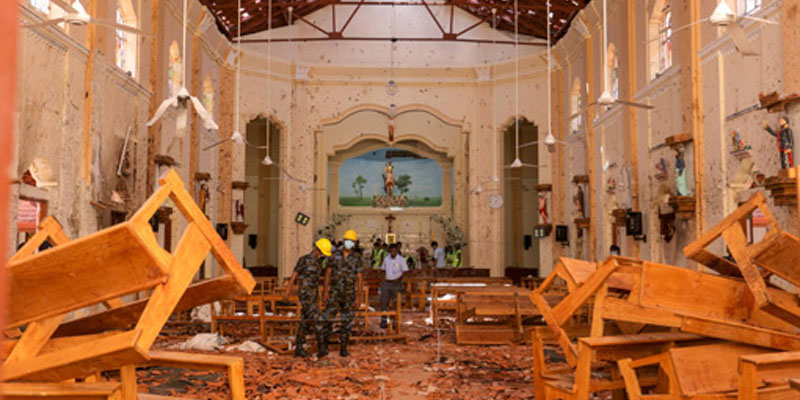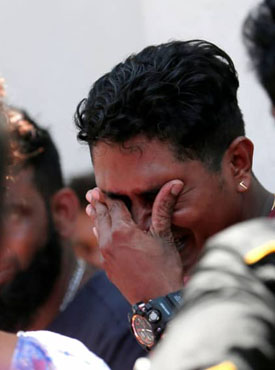2019 Jun 21
“Trauma is hell on earth. Trauma resolved is a gift from the gods.” ― Peter A. Levine
Terror attacks aim to sensationalize chaos and instil overwhelming fear among the masses. Two months following the Easter Sunday attacks, the psychological wounds still persist among many. Long-term effects of trauma can manifest at different stages of our life, which is why protecting our mental health in the here and now is of utmost importance.

Counselling psychologist Nivendra Uduman points out that “reactions experienced by people directly or indirectly affected by any of the recent terrorist attacks in Sri Lanka would last for varying amounts of time. Most stress reactions tend to die down on their own, but not always for everyone.” According to him, some people may experience stress reactions for more than a month, but it is hard to pinpoint how long it generally takes for someone to mentally recover from a terror attack as each individual differs.
Symptoms vary according to each individual. It is important to be mindful of this when reaching out to friends and family. Short and long term symptoms that usually surface following a crisis event can manifest in many forms.
People who were not directly exposed to the attacks can also experience distress and post-traumatic stress, even months following the incident. The fear that a crisis event such as the Easter Sunday bombings can bring has the potential to alter behaviour patterns. In the long term, people may have a tendency to make different decisions about their modes of travelling, employment, which events they attend and even who they socialize with. Interestingly, reports indicate that a terrorist attack can trigger both positive and negative responses amongst different people. Positive responses usually include dedicating time to helping others, making an extra effort to unite communities, showing more concern for friends and family, assisting others and avoiding unhealthy habits. Negative responses can vary from increased anxiety, alcohol consumption and insomnia to poor functioning at the workplace.
Usually, most symptoms fade within days and weeks following the attacks. However, those who were directly exposed to the event, young children, or those who have had similar past experiences are more likely to run the risk of experiencing long-term psychological symptoms. Yet, it may be reassuring to remind ourselves that most human beings are naturally inclined to be resilient and strong following an attack.
Dealing with the aftermath

Going about your daily activities will help immensely in making you feel in control of the situation. Doing so may help those around you (i.e. family members, children) to deal with the aftermath of the incident in a calm and orderly manner.
“It is important that one takes care of oneself in the long run, by attending to basic needs like adequate sleep, good nutrition and hydration, exercise and also maintaining some simple practices like sharing feelings with someone they trust, writing about one’s thoughts and feelings, and it would also be beneficial to speak to a counsellor or a therapist.” – Nivendra
Nivendra also pointed out that someone does not necessarily have to have serious problems to seek help from a mental health practitioner. Therapy can help anyone in making sense of the situation, gain clarity on their thoughts, to be more self-aware and grow through their traumatic experiences. In addition to this, many find solace through spiritual care and practices.
There are several ways to reach out and extend your help to someone who is affected by the terror attacks. One of the simplest ways include being a source of human contact by providing a listening ear and acting in a caring and loving way.
“It is also vital that people feel safe and secure in order to be able to positively deal with the aftermath, and this especially applies to children. Parents and schools must take measures to make sure that a child feels safe.”
Helping children understand
Children may exhibit their fear and confusion in different ways. Start by acknowledging that there is no right or wrong way to feel in situations like this. Some responses may include being easily startled, anger, sadness, trouble sleeping and nightmares, repeated drawing or playing about events related to the traumatic event.
Parents or guardians can help by spending more time with the children, providing a space to explain what they feel without interruption, praying together as a family, involving them in family activities or asking them to help you with tasks, staying calm during anger outbursts and limiting the time spent watching TV, for example.
A common problem that many parents and caregivers face is not knowing how to explain a crisis event to a child. These tips may help in doing so:
- Start discussing the topic but do not force them to speak
- Some children communicate by drawing pictures or playing
- Listen attentively and let them express themselves freely
- Share your feelings with them as well
- Reassure them that the world is a good place but sometimes, there are bad people who do bad things
- Do not lie to your child. Help them understand that bad things happen but there are people working hard to keep us safe
- Try to focus more on the positive things that have occurred since the event
What are the long-term signs of post-traumatic distress?
Long term responses to a traumatic event can range from intrusive thoughts and images about the traumatic event to flashbacks and nightmares, intense distress based on triggers inside and outside the body, being overly vigilant, being startled easily, avoidance of thoughts, memories, places etc. associated with the traumatic event, feeling numb, negative evaluation of one’s self, self-blame, constant low mood, loss of interest in activities that were previously enjoyed and even detachment from others.
When to seek professional help
If you or someone you know exhibits any of the signs mentioned above, it is important to seek professional help as soon as possible. You can help by accompanying your friend or relative to appointments and supporting them through their treatment. Alternatively, reaching out to loved ones who exhibit these symptoms and offering them support in any way needed can make all the difference.
What should volunteers know before helping victims?
“Helping people affected by the attacks is something that requires a sense of great responsibility and commitment. There is the need for time, empathy, compassion, and skill. In a situation like this, people are highly motivated to offer support in various ways which Sri Lanka as a country is known for. However, helping people without the proper knowledge and awareness can sometimes be harmful.
The basic principle of Do No Harm should be applied to every situation in which support is offered to people who have been affected. There are organizations in the field of mental health who are offering introductory training for volunteers in Psychological First Aid and other emotional support skills. It is recommended that anyone wanting to help people with emotional support attend these training programmes and educate themselves. We cannot re-traumatize people, and it is not good practice to ask people to recount their stories over and over again. This applies to the media as well.” – Nivendra
Here are a few helplines for anyone seeking support:
- The Ohana Project – 0777346334 (Nivendra), 0774979641 (Nilushka)
- CCC line 1333 (24 hours)
- NIMH toll free hotline – 1926 (24 hours)
- 0717639898 (24 hours)
- Sumithrayo -011 2696666 (9am to 8pm)
Mental health should be a prime concern during a crisis event, in order to collectively ensure that no one suffers from long-term trauma or any other mental health issue. Look out for your loved ones and reach out to those in need in your own little way. Together, we will show the world that our resilience will always be greater than fear.
Cover Photo Creadits The Japan Times







